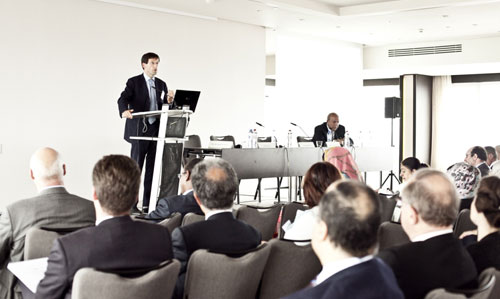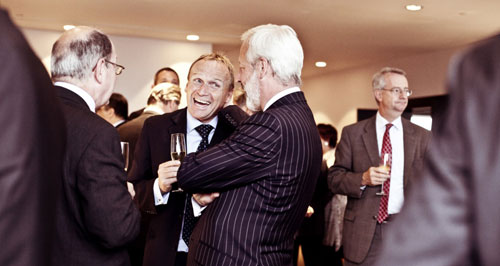Past Events
Celebrating 35 years of Business Synergy between Belgium, Luxembourg and the Arab World
Brussels - 11 June 2013
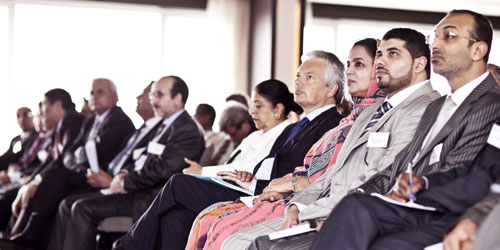
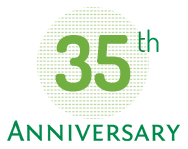 “In a person’s life, the age of thirty-five is one of those milestones when one takes a moment to take stock of his or her life: to consider the progress one has made over all those years and successes achieved, but also to stop and think about the lessons that can be learnt from more difficult periods, in order to engage in continuous self-improvement and gear up to tackle the challenges that lie ahead. It’s no different for the Chamber. At its thirty-fifth anniversary, it can proudly look back on more than three decades of developing its role as a bridge between Belgium and Luxembourg on the one side, and the Arab world on the other.” These are the words with which Johan Beerlandt, President of the ABLCC, opened the seminar that was organized on the 11th of June in Brussels to celebrate the 35th anniversary of the ABLCC.
“In a person’s life, the age of thirty-five is one of those milestones when one takes a moment to take stock of his or her life: to consider the progress one has made over all those years and successes achieved, but also to stop and think about the lessons that can be learnt from more difficult periods, in order to engage in continuous self-improvement and gear up to tackle the challenges that lie ahead. It’s no different for the Chamber. At its thirty-fifth anniversary, it can proudly look back on more than three decades of developing its role as a bridge between Belgium and Luxembourg on the one side, and the Arab world on the other.” These are the words with which Johan Beerlandt, President of the ABLCC, opened the seminar that was organized on the 11th of June in Brussels to celebrate the 35th anniversary of the ABLCC.
The Chamber is blowing out its 35 candles at a time when challenges in both Europe and the Arab world alike are plenty. But, as was pointed out by H.E. Nabeela Al-Mulla, Ambassador of the State of Kuwait and Dean of the Arab Diplomatic Corps, “regardless of the season Europe and the Arab world may be in – be it a European summer or an Arab winter – it is of the utmost importance that the Chamber continues its valuable work for the creation of opportunities and the development of business networks to nurture invaluable economic development.”
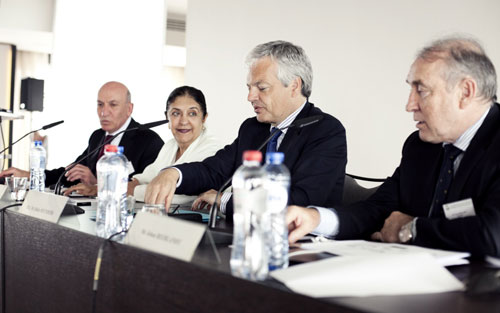
An indisputable high light of the event was the intervention made by H.E. Didier Reynders, Belgian Vice Prime Minister and Minister of the Foreign Affairs, External Trade and European Affairs, who discussed the “Issues and Challenges in the relations between Belgium and the Arab world.” Minister Reynders notes that trade with Egypt and Tunisia has remained low, while the ripple effects of the collapse of the Syrian economy are not to be underestimated. This does not mean, however, that the he does not welcome the wind of change blowing in the countries of the Middle East and on the Mediterranean Coast, to the contrary. Minister Reynders sees reasons for hope, pointing out that during his first trip as Minister of Foreign Affairs to the Arab world, he was pleased to discover vibrant and dynamic business communities. Drawing from the Latin-American and South-East Asian experiences, he underscores the importance of developing strong liberal and free trade beliefs, stating that the development of sound economic governance is the best way to get the Arab Spring countries on the right track. According to the Minister, this rings true for several countries in the Arab world where free trade is hampered by important handicaps as government rigidity, the absence of sufficient legal frameworks, and a lack of support to entrepreneurs. Underscoring that it is not up to his country to lecture others on what to do, he nevertheless terms Belgium as an excellent partner for the Arab world to overcome these hurdles, pointing out that it shows itself a strong supporter of the process of Arab regional economic integration. In any case, whatever the future may bring, one thing is very clear to Minister Reynders: when, in another 35 years, we will be celebrating the 70th anniversary of the Chamber, the Belgian-Arab partnership will only have gained in importance.
Qaisar Hijazin, Secretary General of the ABLCC, was pleased to be able to leave the economic analyses to Luc Coene, Governor of the National Bank of Belgium and Etienne de Callataÿ, Chief Economist at the Bank Degroof. He was, however, more than happy to comment on the Arab-Belgian-Luxembourgish trade statistics, pointing out that the exports of the Belgium-Luxembourg Economic Union to the Arab world amounted to an estimated 75 billion Belgian francs in 1980, which equals 1.8 billion euro, and have climbed steadily over the years to reach 9.7 billion euro today.
Addressing the challenges the Arab world is currently facing, Ghassan Ejjeh, Vice President of BESIX, in his turn wholeheartedly echoes the importance attached by Reynders to improving investment through EU-GCC cooperation and effectuating a transfer of technology to North-Africa.
Before turning to Belgium, Governor Coene starts out with an insightful analysis of the international economic context, painting a picture of a global economic environment in which tensions on sovereign debt markets continue to subside, and stock markets rally. Although the euro area crisis and the deterioration of the economic situation at a global level are met with important policy reactions from the ECB and the banking union since the summer of 2012, Coene points out that growth in trade among major economic zones remains unequal and confidence is fragile, while recession spreads to the core in the euro area, resulting in a deterioration of the job market and very weak inflationary pressures. Predicting a 0% growth for 2013, Coene sees the current year as a transition towards firmer growth in 2014. Both private consumption – which he expects to remain flat in 2013 – and investment in housing are set to experience a modest improvement during the next year, while business investment is projected to increase by 3%. The Governor concludes that Belgium will remain one of the better pupils in the Euro zone region in 2014, with an increase in productivity set to have a positive effect on labor costs.
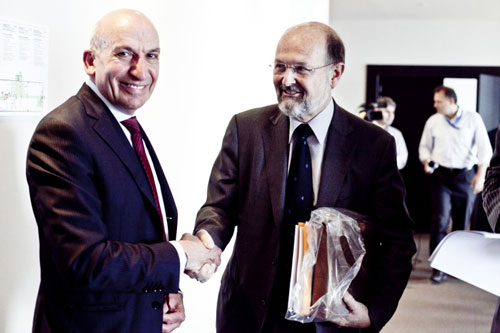
Enthusiastically debunking the cliché image of the grey economic expert with a most energetic presentation entitled “Trade under Threat? Europe and the Rest of the World”, Chief Economist at Bank Degroof Etienne de Callataÿ does not allow for the attention of the public to slacken after two hours of interesting and detailed presentations. Although not many European citizens will dispute the fact that several European policies are quite ‘hard’, Mr. de Callataÿ underscores that “misery endured today does not equal wrong policies.” What’s more, according to the economist, the period 2010-2013 will go down in history as great years in terms of reforms. Although he is less optimistic about 2014 than Mr. Coene, his outlook cannot be termed gloomy: lower inflation means less pressure on real disposable income, there is some support from external growth, fiscal tightening and extreme risks are decreasing and Mario Draghi’s “positive contagion” is spreading. And is trade really under threat? On the one hand, limited economic growth in developed countries, convergence of wages, tax shifts, Chinese economic rebalancing and technological developments (3D printing!) are not helping to spur on the global exchange of goods. On the other hand, increasing purchasing power and a broadening of supply in emerging countries, increasing specialization and the emergence of new frontier countries point towards a bright future for trade between Europe and the rest of the world. And one thing that should not be forgotten when discussing (the future of) trade, according to Mr. de Callataÿ… is that we simply enjoy it!
